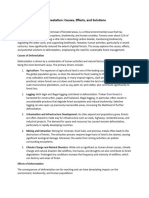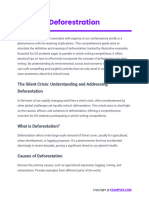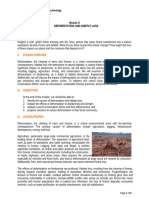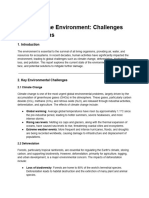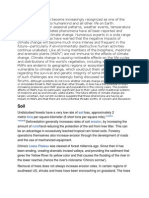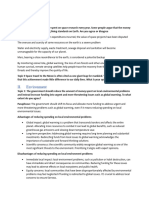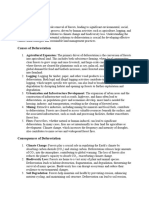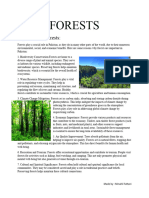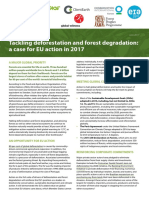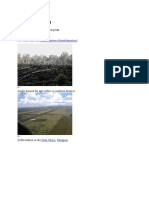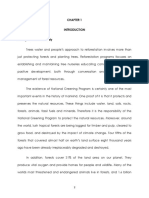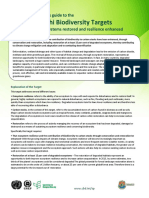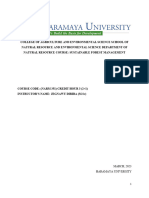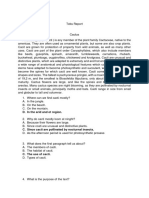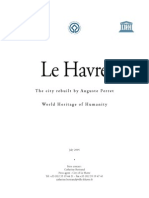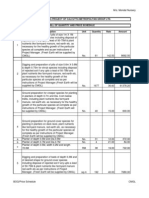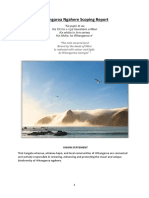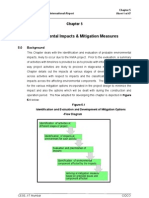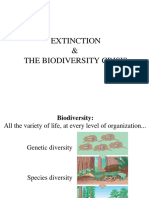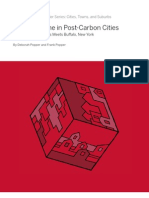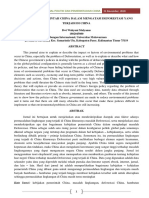0 ratings0% found this document useful (0 votes)
13 viewsDeforestation
Deforestation
Uploaded by
zaineb chzkibInternational reaction and strategies towards deforestation:
1. Many international organizations like the UN and World Bank have developed programs to curb deforestation through Reducing Emissions from Deforestation and Forest Degradation (REDD).
2. There needs to be an increase in the area of forest permanently reserved for timber production to promote sustainable long-term management.
3. Sustainable forest management must be ecologically, economically, and socially sustainable to control issues like soil erosion and loss of soil fertility while also being viable long-term.
Copyright:
© All Rights Reserved
Available Formats
Download as DOCX, PDF, TXT or read online from Scribd
Deforestation
Deforestation
Uploaded by
zaineb chzkib0 ratings0% found this document useful (0 votes)
13 views1 pageInternational reaction and strategies towards deforestation:
1. Many international organizations like the UN and World Bank have developed programs to curb deforestation through Reducing Emissions from Deforestation and Forest Degradation (REDD).
2. There needs to be an increase in the area of forest permanently reserved for timber production to promote sustainable long-term management.
3. Sustainable forest management must be ecologically, economically, and socially sustainable to control issues like soil erosion and loss of soil fertility while also being viable long-term.
Copyright
© © All Rights Reserved
Available Formats
DOCX, PDF, TXT or read online from Scribd
Share this document
Did you find this document useful?
Is this content inappropriate?
International reaction and strategies towards deforestation:
1. Many international organizations like the UN and World Bank have developed programs to curb deforestation through Reducing Emissions from Deforestation and Forest Degradation (REDD).
2. There needs to be an increase in the area of forest permanently reserved for timber production to promote sustainable long-term management.
3. Sustainable forest management must be ecologically, economically, and socially sustainable to control issues like soil erosion and loss of soil fertility while also being viable long-term.
Copyright:
© All Rights Reserved
Available Formats
Download as DOCX, PDF, TXT or read online from Scribd
Download as docx, pdf, or txt
0 ratings0% found this document useful (0 votes)
13 views1 pageDeforestation
Deforestation
Uploaded by
zaineb chzkibInternational reaction and strategies towards deforestation:
1. Many international organizations like the UN and World Bank have developed programs to curb deforestation through Reducing Emissions from Deforestation and Forest Degradation (REDD).
2. There needs to be an increase in the area of forest permanently reserved for timber production to promote sustainable long-term management.
3. Sustainable forest management must be ecologically, economically, and socially sustainable to control issues like soil erosion and loss of soil fertility while also being viable long-term.
Copyright:
© All Rights Reserved
Available Formats
Download as DOCX, PDF, TXT or read online from Scribd
Download as docx, pdf, or txt
You are on page 1of 1
International reaction and strategies towards deforestation:
Here are some international efforts deployed to curb deforestation:
1. Reducing emissions from deforestation and forest degradation:
Many international organizations including the United Nations and the World Bank have begun to
develop programmes to curb deforestation mainly through Reducing Emissions from Deforestation
and Forest Degradation (REDD).
2. Increase the area of forest permanently reserved for timber production:
The most serious impediment to sustainable forest management is the lack of dedicated forests
specifically set aside for timber production. If the forest does not have a dedicated long-term tenure
for timber production then there is no incentive to care for the long-term interests of the forest.
3. Promote sustainable management :
In order to promote sustainable forest management, it must be sustainable ecologically,
economically and socially. Ecological sustainability means that the ecological values of the forest
must not be degraded and if possible they should be improved (soil erosion should be controlled,
soil fertility should not be lost…) However, management for environmental services alone is not
economically and socially sustainable.
4. Improve the information base and monitoring:
Information on the global distribution of biodiversity and forest poverty is inadequate. Knowledge of
how much forest, where it is and what it is composed of seems to be straightforward but surprisingly
this most basic information is not always available. It is not possible to properly manage a forest
ecosystem without first understanding it.
5. Support and reforms :
Campaigns that aims at reforming the large aid agencies that fund development projects should be
supported as well as those Local campaigns fighting against specific projects such as mining, dams,
industrial development and tourism.
Impact of deforestation on climate change in Brazil:
Brazil contains some of the most biodiverse savannas in the world, yet more than 46% of its original
cover has been cleared to make way for crops and pastures. These large land-use transitions
influence the regional climate by reducing evapotranspiration (ET), increasing land surface
temperature (LST) and ultimately reducing precipitation.
To date, land changes have caused a 10% reduction in water recycled to the atmosphere annually
and a 0.9°C increase in average LST across the biome, compared to the historic baseline under native
vegetation
You might also like
- Animal Nature, Human Racism, and The Future of Zoos, David Samuels, Harpers June 2012Document16 pagesAnimal Nature, Human Racism, and The Future of Zoos, David Samuels, Harpers June 2012Martha BrockNo ratings yet
- English Speaking-DeforestationDocument8 pagesEnglish Speaking-Deforestationikram729No ratings yet
- Environmental management case studyDocument6 pagesEnvironmental management case studyyiyav67176No ratings yet
- Deforestation: Presented By: Khadija AshrafDocument23 pagesDeforestation: Presented By: Khadija AshrafRehman UllahNo ratings yet
- Midterm A2-Groups 16&17Document5 pagesMidterm A2-Groups 16&17237140249038No ratings yet
- Aditya RajbanshiDocument11 pagesAditya Rajbanshihritish.raj1393No ratings yet
- Southern Alliance For Indigenous Resources: Honestly T. NdlovuDocument24 pagesSouthern Alliance For Indigenous Resources: Honestly T. NdlovuMunyaNo ratings yet
- Deforestation Causes, Effects, and SolutionsDocument3 pagesDeforestation Causes, Effects, and Solutionspolash.tscNo ratings yet
- Arghadeep Chatterjee - DeforestationDocument10 pagesArghadeep Chatterjee - DeforestationArghadeep ChatterjeeNo ratings yet
- DeforestrationDocument5 pagesDeforestrationchorrcychenNo ratings yet
- Ala DeforestrationDocument1 pageAla Deforestrationgillianbernice.alaNo ratings yet
- GEE1 Learning Module 5Document5 pagesGEE1 Learning Module 5jazirahbethbroyoNo ratings yet
- Mitigation and Adaptation To Climate Change Through Sustainablerainforest ManagementDocument4 pagesMitigation and Adaptation To Climate Change Through Sustainablerainforest ManagementsocialomicsNo ratings yet
- 1 pls-1Document4 pages1 pls-1pinkleafpurplepikminNo ratings yet
- Soil Tons Erosion Runoff: Citation NeededDocument6 pagesSoil Tons Erosion Runoff: Citation NeededShailendra SinghNo ratings yet
- Forests and Climate Change Issues Brief 2021Document2 pagesForests and Climate Change Issues Brief 2021aryakundal2No ratings yet
- Getting Started With The Bonn Challenge 2018Document24 pagesGetting Started With The Bonn Challenge 2018narayanaNo ratings yet
- TopicDocument4 pagesTopicThành Minh TrầnnNo ratings yet
- DeforestationDocument3 pagesDeforestationsgrc9795No ratings yet
- Research Paper On DeforestationDocument3 pagesResearch Paper On Deforestationkhan.eee.200105156No ratings yet
- Deforestation: Deforestation Is The Removal of Trees and Other Plants From Forest Areas More Quickly Than TheyDocument2 pagesDeforestation: Deforestation Is The Removal of Trees and Other Plants From Forest Areas More Quickly Than TheyShakthidhar RaoNo ratings yet
- FORESTSDocument5 pagesFORESTSMinahil FattaniNo ratings yet
- Deforestation.pptxDocument17 pagesDeforestation.pptxNoor Syah Wati TadiNo ratings yet
- DeforestrationDocument18 pagesDeforestrationSakshi AgarkarNo ratings yet
- Need for Forest LawDocument7 pagesNeed for Forest LawgkdzdgpzbpNo ratings yet
- Multidisciplinary Nature of Environmental Studies: Unit-IDocument34 pagesMultidisciplinary Nature of Environmental Studies: Unit-IsarfarzNo ratings yet
- A Case For EU Action in 2017Document2 pagesA Case For EU Action in 2017eilftahNo ratings yet
- The Vital Role of Forests Why Forests Matter Definition Forests are crucial ecosystems that cover about 31% of the Earth’s land area. They are vital for sustaining life by providing oxygen, sheltDocument6 pagesThe Vital Role of Forests Why Forests Matter Definition Forests are crucial ecosystems that cover about 31% of the Earth’s land area. They are vital for sustaining life by providing oxygen, sheltaditiaditiaditi2000No ratings yet
- Environmental StudiesDocument13 pagesEnvironmental StudiesShinestNo ratings yet
- Welcome To CIFOR Updated 2014Document55 pagesWelcome To CIFOR Updated 2014Muhamad RismanNo ratings yet
- Forest Landscape RestorationDocument8 pagesForest Landscape RestorationThang LongNo ratings yet
- Deforestation ReportDocument10 pagesDeforestation ReportElina KarshanovaNo ratings yet
- Sustainabale DevelopmentDocument4 pagesSustainabale DevelopmentMuhammed KabèerNo ratings yet
- DEFORESTATIONDocument3 pagesDEFORESTATIONProserfina MagdadaroNo ratings yet
- Hempel Foundation Biodiversity Strategy 2022 2024 FinalDocument12 pagesHempel Foundation Biodiversity Strategy 2022 2024 FinalKasper B.No ratings yet
- Tropical Deforestation: Problems and SolutionsDocument42 pagesTropical Deforestation: Problems and SolutionsAshraf AtiqueNo ratings yet
- V2e T7Document150 pagesV2e T7Kewal BagdeNo ratings yet
- GammaDocument10 pagesGammanmember104No ratings yet
- Deforestation: Navigation SearchDocument70 pagesDeforestation: Navigation SearchAshwin KumarNo ratings yet
- Kats EvsDocument14 pagesKats EvsPooja JainNo ratings yet
- Chapter 1Document13 pagesChapter 1Gia Joyce Ancheta100% (1)
- Land Restoration and Afforestation: Why in News?Document10 pagesLand Restoration and Afforestation: Why in News?Aryan RajNo ratings yet
- Restoration Roundtable Concept Note FInalDocument3 pagesRestoration Roundtable Concept Note FInalamanjjjjj5955No ratings yet
- Forest ManagementDocument6 pagesForest ManagementSUMIT naikNo ratings yet
- DeforestationDocument22 pagesDeforestationmanareltouny89No ratings yet
- Multidisciplinary Nature of EVSDocument27 pagesMultidisciplinary Nature of EVSAnonymous 07qeapnNo ratings yet
- T15 Quick Guide enDocument2 pagesT15 Quick Guide enLopa LopaNo ratings yet
- Position Paper - Kyle, SophiaDocument15 pagesPosition Paper - Kyle, SophiaKyle CamayaNo ratings yet
- Sustainable Forest Management,: Biodiversity and LivelihoodsDocument39 pagesSustainable Forest Management,: Biodiversity and LivelihoodsrisalNo ratings yet
- 7 - The Role of DeforestationDocument2 pages7 - The Role of DeforestationMansoor AsifNo ratings yet
- Orca Share Media1677800755395 7037206419559676741Document14 pagesOrca Share Media1677800755395 7037206419559676741Jahsmen NavarroNo ratings yet
- Environment Mangament Notes 1Document40 pagesEnvironment Mangament Notes 1jayeshpereNo ratings yet
- Forest OdtDocument1 pageForest OdtvinothasoniNo ratings yet
- Environmental Conservation Must Be Prioritized in Development PoliciesDocument2 pagesEnvironmental Conservation Must Be Prioritized in Development Policieskelvinpambut03No ratings yet
- Deforestation - Global Environmental PoliticsDocument13 pagesDeforestation - Global Environmental Politicsapi-301786718No ratings yet
- ENVIRONMENTAL-PROTECTIONDocument42 pagesENVIRONMENTAL-PROTECTIONfrankieluzaNo ratings yet
- SFM For ExitDocument45 pagesSFM For ExittengertdereNo ratings yet
- Group 5 Sustainable Land Management To Minimize Rampant DeforestationDocument6 pagesGroup 5 Sustainable Land Management To Minimize Rampant DeforestationRobert Bruce HammertonNo ratings yet
- What Is AfforestationDocument6 pagesWhat Is AfforestationSohel BangiNo ratings yet
- Biodiversity Finance: Innovative Tools for a Flourishing PlanetFrom EverandBiodiversity Finance: Innovative Tools for a Flourishing PlanetNo ratings yet
- TeksDocument4 pagesTeksZainurNo ratings yet
- Book of Abstracts ECE2018Document340 pagesBook of Abstracts ECE2018GeroldNo ratings yet
- CHM 576 (Environmental Chemistry)Document60 pagesCHM 576 (Environmental Chemistry)Ummu UmairahNo ratings yet
- Blackberry 2Document2 pagesBlackberry 2api-279811261No ratings yet
- Thesis Complete EditedDocument25 pagesThesis Complete EditedCarl Joseph Moredo50% (6)
- 5.5 Green Belt Development PlanDocument9 pages5.5 Green Belt Development PlanratannsNo ratings yet
- Le Havre-The City Rebuilt-Auguste Perret PDFDocument20 pagesLe Havre-The City Rebuilt-Auguste Perret PDFLenin Montenegro VilchezNo ratings yet
- Human Population and Environment ObjectiveDocument24 pagesHuman Population and Environment ObjectiveSindhura ValluriNo ratings yet
- Alberti - 2010 - Maintaining Ecological Integrity and Sustaining EcDocument7 pagesAlberti - 2010 - Maintaining Ecological Integrity and Sustaining Ecma hiryeNo ratings yet
- Forest Types of Pak BY Muhammadnadeem Student of University of Swat Center For Agriculture Sciences and ForestryDocument11 pagesForest Types of Pak BY Muhammadnadeem Student of University of Swat Center For Agriculture Sciences and ForestryMuhammad Nadeem100% (1)
- BOQ PlantationDocument7 pagesBOQ PlantationUTTAL RAY100% (3)
- Final Scoping ReportDocument31 pagesFinal Scoping ReportWhangaroaNo ratings yet
- Inventarisasi Keanekaragaman Anggrek Dan Sebaran Vertikal Anggrek Epifit Di Taman Nasional Bantimurung BulusaraungDocument12 pagesInventarisasi Keanekaragaman Anggrek Dan Sebaran Vertikal Anggrek Epifit Di Taman Nasional Bantimurung BulusaraungSyfrh FiraNo ratings yet
- Chapter-5 Environmental Impacts & Mitigation MeasuresDocument47 pagesChapter-5 Environmental Impacts & Mitigation MeasuresCIDCONMIA.COMNo ratings yet
- Science 6 W7D1Document3 pagesScience 6 W7D1Mark DirainNo ratings yet
- Lake Lanao Policy StudyDocument30 pagesLake Lanao Policy StudyGodfrey MordenoNo ratings yet
- Pelestarian Telaga Sandang Salah Satu Kearifan Lokal Kabupaten GresikDocument4 pagesPelestarian Telaga Sandang Salah Satu Kearifan Lokal Kabupaten Gresikrtndnda22No ratings yet
- Lect 27 - Extinction & Biodiversity CrisisDocument52 pagesLect 27 - Extinction & Biodiversity CrisisJoyae ChavezNo ratings yet
- GG Ifa CL Af CB FV v5 0-2 Protected enDocument231 pagesGG Ifa CL Af CB FV v5 0-2 Protected enmkmikmiNo ratings yet
- Recreational 31july 2 Single PageDocument60 pagesRecreational 31july 2 Single PageDaniela Cristina IbanescuNo ratings yet
- CITIES: Smart Decline by Deborah Popper and Frank PopperDocument10 pagesCITIES: Smart Decline by Deborah Popper and Frank PopperPost Carbon InstituteNo ratings yet
- Research Project DescriptionDocument5 pagesResearch Project DescriptionMeghan BarrettNo ratings yet
- Dwi Wahyuni Mulyanus - 1802045080 - HIB - Jurnal ChinaDocument10 pagesDwi Wahyuni Mulyanus - 1802045080 - HIB - Jurnal Chinadwi wahyuniNo ratings yet
- Environmental Protection and Management of Volos Sea-PortDocument97 pagesEnvironmental Protection and Management of Volos Sea-PortValerie Masita HariadiNo ratings yet
- Nueva Ecija-Area Based Management Plan For Pampanga River Basin 2014Document17 pagesNueva Ecija-Area Based Management Plan For Pampanga River Basin 2014Margarita AngelesNo ratings yet
- Phil Wildlife Jan 10, 2012 NotesDocument15 pagesPhil Wildlife Jan 10, 2012 NotesAbigail CuyacotNo ratings yet
- Ancient and Historic Metals 3/3Document123 pagesAncient and Historic Metals 3/3argaricoNo ratings yet
- Antonio Lopez - Power PointDocument7 pagesAntonio Lopez - Power Pointwinthida100% (1)
- Afghanistan MammalsDocument167 pagesAfghanistan MammalsLatha DeviNo ratings yet







